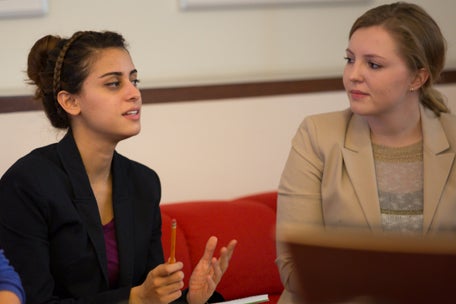Georgetown Students Analyze Qatar’s Urban Planning

A research project called Doha by Design: Urban Planning and Social Space in Doha, Qatar, is underway by four Georgetown University in Qatar (GU-Q) students and their two faculty mentors.
The project, sponsored by a Qatar Foundation (QF) Undergraduate Research Experience Program (UREP) grant, analyzes Doha’s use of planning and space, and the effects of those plans on social interaction.
The four student researchers are GU-Q students Khadija Mahsud (Class of 2014), Nadia Al-Khater (Class of 2016), Catherine Lechicki (Class of 2016) and Sana Jamal (Class of 2016). Their project mentors are GU-Q political scientist, Dr. Mark Farha and Georgetown University sociolinguist, Dr. Patricia O’Connor.
The students assert that there is well-documented quantitative data on urban development, but that no qualitative research exists. This is the information vacuum the student researchers seek to fill.
Al-Khater explained: “One of the most valuable experiences from the research process through UREP is making the step into the real world to collect data and being able to test hypotheses and draw conclusions on what we have been able to observe ourselves rather than sticking purely to data that people have reported in the past.”
“We had to go through training and learn how to ethically undertake projects involving behavioral research,” added Mahsud. “The actual survey-giving experience requires patience and care. We learned how best to formulate surveys and how to approach potential survey takers. The project has also taught me a lot about the city of Doha, but also about urban space in general.”
The four GU-Q students were pleased to get feedback on their research by meeting with planning and design professionals from Lusail Real Estate Development Company, Turner International Middle East, and Allies and Morrison Architects, whose current projects include Lusail City and Msheireb Downtown Doha. The in-depth meeting included a student-led tour of the new LEED (Leadership in Energy & Environmental Design) dormitories at Education City, and an opportunity for analysis and discussion of the students’ UREP project with some of the world’s leading urban designers.
Renée Gallant, GU-Q’s associate director of outreach and corporate engagement, said, “Doha by Design provides a wonderful illustration of the intersection and relevance of the study of culture, economics and politics with the seemingly unrelated industries of urban planning, design and architecture. I believe that our professional guests left with a new perspective on their work, thanks to the insightful discussion with our students.”